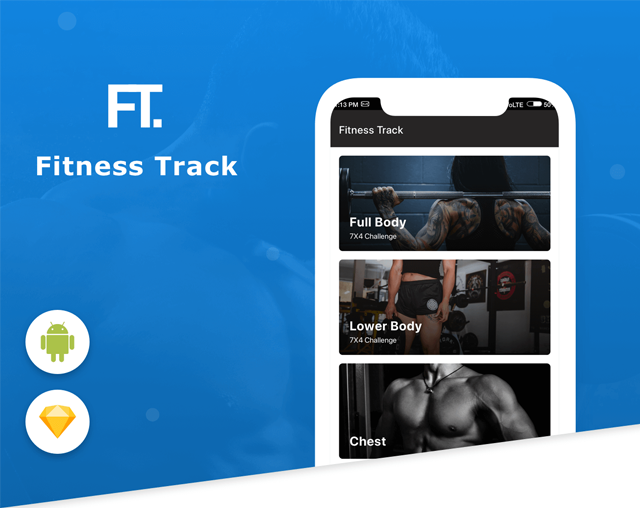Fitness App
Today, to develop an application like Sworkit, Aaptiv, or Nike + Run Club, we do not need hundreds of thousands of dollars to develop. So what is the secret?
Key Summary
- Overview: The article, likely published by InApps Technology in 2022, explores the development of fitness mobile apps, detailing key features, technologies, and strategies to create engaging, scalable health solutions.
- Key Points:
- Fitness App Market:
- Valued at ~$1.5 billion in 2022, driven by post-COVID demand for digital fitness solutions.
- Targets users seeking workout tracking, nutrition guidance, and wellness tools.
- Essential Features:
- Workout Tracking: Logs exercises, calories, and progress with wearables integration (e.g., Apple Watch, Fitbit).
- Nutrition Planning: AI-driven meal plans, calorie counters, or barcode scanners.
- Live Coaching: Real-time video workouts via WebRTC or Zoom APIs.
- Gamification: Badges, challenges, or leaderboards to boost engagement.
- Push Notifications: Reminders for workouts, goals, or subscription renewals.
- Social Sharing: Integration with Instagram, Strava for community engagement.
- Advanced Features:
- Augmented Reality (AR): Virtual workout environments or form correction (ARKit, ARCore).
- AI Personalization: Tailored plans based on user data (TensorFlow, PyTorch).
- Mental Wellness: Meditation, mood tracking, or sleep analysis.
- Development Process:
- Planning: Define target audience (e.g., gym-goers, beginners) and monetization (freemium, subscription).
- Tech Stack:
- Frontend: Flutter, React Native for cross-platform iOS/Android apps.
- Backend: Node.js, Django for APIs; Firebase for real-time features.
- Database: MongoDB, PostgreSQL for user and workout data.
- Cloud: AWS, Google Cloud for scalability and storage.
- Integrations: HealthKit, Google Fit for wearables; Stripe for payments.
- Agile Workflow: Scrum sprints, prototyping (Figma), CI/CD (GitHub Actions).
- Testing: Cross-device compatibility (BrowserStack), performance (JMeter), security audits.
- Security and Compliance:
- Encrypt health data with HTTPS, AES-256.
- Comply with GDPR, HIPAA for user privacy.
- Implement biometric authentication (face ID, fingerprint).
- Benefits:
- High user engagement with personalized, interactive features.
- Scalable revenue via subscriptions or in-app purchases.
- Supports health trends, enhancing brand loyalty.
- Challenges:
- High development costs for AR, AI, or live streaming features.
- Competition from established apps (e.g., MyFitnessPal, Peloton).
- Ensuring data privacy and regulatory compliance.
- Retaining users in a crowded market.
- 2022 Trends:
- Surge in hybrid fitness apps combining physical and digital workouts.
- Growth of wearable-driven apps with 5G for real-time syncing.
- Rise of mental health features in fitness apps.
- Increased outsourcing to Vietnam for cost-effective development.
- Fitness App Market:
- Use Cases:
- Gym chains building branded apps for member workouts.
- Startups creating AI-driven fitness coaches for home users.
- Healthtech firms integrating wearables for corporate wellness programs.
- Conclusion: In 2022, as likely outlined by InApps Technology, fitness app development leverages Flutter, AI, and wearables to deliver engaging, scalable solutions, with providers like InApps offering expertise to navigate costs, compliance, and competition.
To develop a marketplace application
Typically, to develop a marketplace application, you’ll need parts of the product like:
– App UI and UX Design
– Mobile Application (iOS and Android)
– Web Portal Admin, where you can easily manage content, manage and analyze users, and interacting with users through the campaigns
– An appropriate marketing strategy after product launch
And the team to execute the project will consist of
– Business Analyst
– Designer
– Software Developer
– Project Manager
– Quality Assurance
The product is launched in the market
After the product is launched in the market and has users, you will also need a DevOps service.
It will not cost a small amount if you want to do all the features at once.
Instead, you just need to pick out the features you really need to bring value to your customers and promote your inherent strengths and resources to make a lean product that can make customers happy and ready to use. People call it an MVP (Minimal Viable Product).
To develop an MVP, depending on the target audience and goals, we will advise a list of features that best suit an optimal and reasonable budget. We will advise in detail for you to make a wise choice about feasibility: cost, time, market acceptance.
There will be 2 solutions:
– Hire a development team to accompany you with product development and are always ready to provide technical support to meet customer satisfaction.
– Product development in stages with estimated time and cost
And no matter which approach we will advise you to apply effectively in your business.
With more than 10 years of experience in developing applications for customers. We always focus on efficiency for customers with a mindset on ROI (Return of Investment). We always research the customer’s business model to advise on appropriate product development.
Please contact us to receive a proposal about the project. We have a special promotion program just for you this month that is a FREE UI DESIGN worth up to 3,000 USD.
Here is a case study we have experience in this kind of product.
We specialize in mobile fitness app development aligned with our customers’ specific requirements. Depending on your requirements, we can deliver various types of fitness apps and assist you in choosing the functional scope for your app.
Main Features
- Customized diet plans
- Workout Programs
- Allow to keep track of daily activity
- Step tracking
- Beautiful UI/UX
- Community-based Aspect
- Wearable Device Integration

Let’s create the next big thing together!
Coming together is a beginning. Keeping together is progress. Working together is success.

















